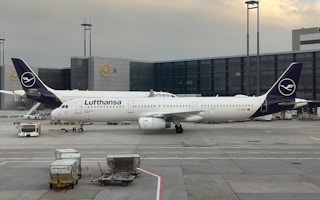Scaling sustainable aviation fuel (SAF) made from scrap plant material – including used cooking oil – risks enticing supply chain players to create more waste to meet feedstock demand, said an official at one of the world’s largest airline groups, who added such fuels are a “bridging technology” towards more advanced low-carbon propellants.
To continue reading, subscribe to Eco‑Business.
There's something for everyone. We offer a range of subscription plans.
- Access our stories and receive our Insights Weekly newsletter with the free EB Member plan.
- Unlock unlimited access to our content and archive with EB Circle.
- Publish your content with EB Premium.
There is more potential in safely increasing the yield of clean jet fuel via technologies such as using solar energy to convert carbon gases into kerosene, said Philipp Bonkatz, general manager of Singapore, Malaysia and Brunei at Germany’s Lufthansa Group.
Most of the sustainable aviation fuel (SAF) available today comes from refining used vegetable cooking oils and agricultural refuse. Development has been slow, with SAF contributing to 0.1 per cent of global jet fuel supply due to high costs.
Bonkatz’s comments mirror sustainability concerns from European lawmakers over biofuel risks. The regional parliament has bans on SAF made from certain crop feedstocks, though waste cooking oil is still allowed.
“Using existing bio-based waste is a good thing, but we should not artificially create more waste just because it can be transformed into profit. That is the challenge,” Bonkatz said at the Greentech Festival conference in Singapore, citing examples such as restaurants cooking up more food than needed. He added that there are also environmental risks linked to monoculture crops such as palm oil and soy.
“Even crops like bamboo, they grow very fast, but I personally cannot see it growing fast enough, and to be made only available for the aviation sector, without negative impacts,” he told Eco-Business.
Biofuels are good “bridging” technologies to boost SAF adoption while developing new production methods, Bonkatz said, adding that there is still some room to safely increase supply from the current low base.
Lufthansa Group is one of the world’s biggest existing users of SAF, and in 2021 committed to spending US$250 million on procurement by 2024. The group owns a range of major European flag carriers, including Lufthansa, Swiss International Air Lines, Brussels Airlines and Austrian Airlines. The group has a combined fleet of over 700 aircraft.
Swiss International Air Lines has been funding the development of a “synthetic” jet fuel by Switzerland-based Synhelion, which concentrates the sun’s heat to make jet fuel out of carbon dioxide, methane and water. Bonkatz said the first flight with Synhelion’s kerosene can take place next year, but the commercial outlook remains unclear and will be affected by cost, production capability and government policies.
The short-term lack of SAF means that Lufthansa Group needs to use carbon offsetting for over 50 per cent of its 2030 climate target, of halving carbon emissions compared to 2019 levels, Bonkatz said. The group wants to go carbon-neutral by 2050.
Others believe airlines need to better engage players in the biogenic SAF supply chain. Speaking alongside Bonkatz, a regional official from American planemaker Boeing said the aviation sector traditionally has not been involved in helping smallholder farmers in Southeast Asia improve feedstock yield sustainably for SAF production.
Jacqueline Lam, regional lead for global sustainability policy and partnerships at Boeing Southeast Asia, noted that Corsia – a major industry standard – does not exclude SAF types based on feedstock as long as it meets certain sustainability criteria, which includes forest safeguards.
Lam added that fuel producers will need to figure out how to better aggregate demand for waste streams, and that stronger government action is needed to accelerate SAF adoption.
“We want SAF to get to a price point that is as competitive as the fossil options. If not, then carbon pricing, or pricing in externalities, is absolutely crucial,” Lam said.
European lawmakers approved a sustainable jet fuel mandate in September, which dictates that airports in the bloc need SAFs to form 2 per cent of jet fuel supply in 2025, rising to 6 per cent by 2030 and 70 per cent by 2050.
The EU permits the use of SAF from agricultural and forestry waste, but not from palm and soy materials, due to concerns about sustainability and competition with food production. Under the latest SAF mandate, the use of synthetic fuels – such as what Synhelion is pursuing – must also rise from 1.2 per cent in 2030 to 35 per cent in 2050.
These targets represent some of the most ambitious SAF policies globally, which the airline industry has said will be tough to meet.
The EU’s efforts to weed out deforestation from agricultural supply chains, including through requiring digital location data from importers, has also riled palm oil producers from Southeast Asia, who claim the regulations are impossible for smallholders to meet. Malaysia and Indonesia account for the bulk of palm product exports globally.










